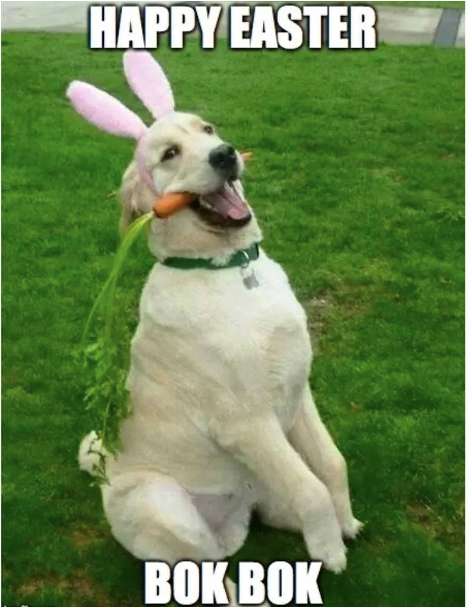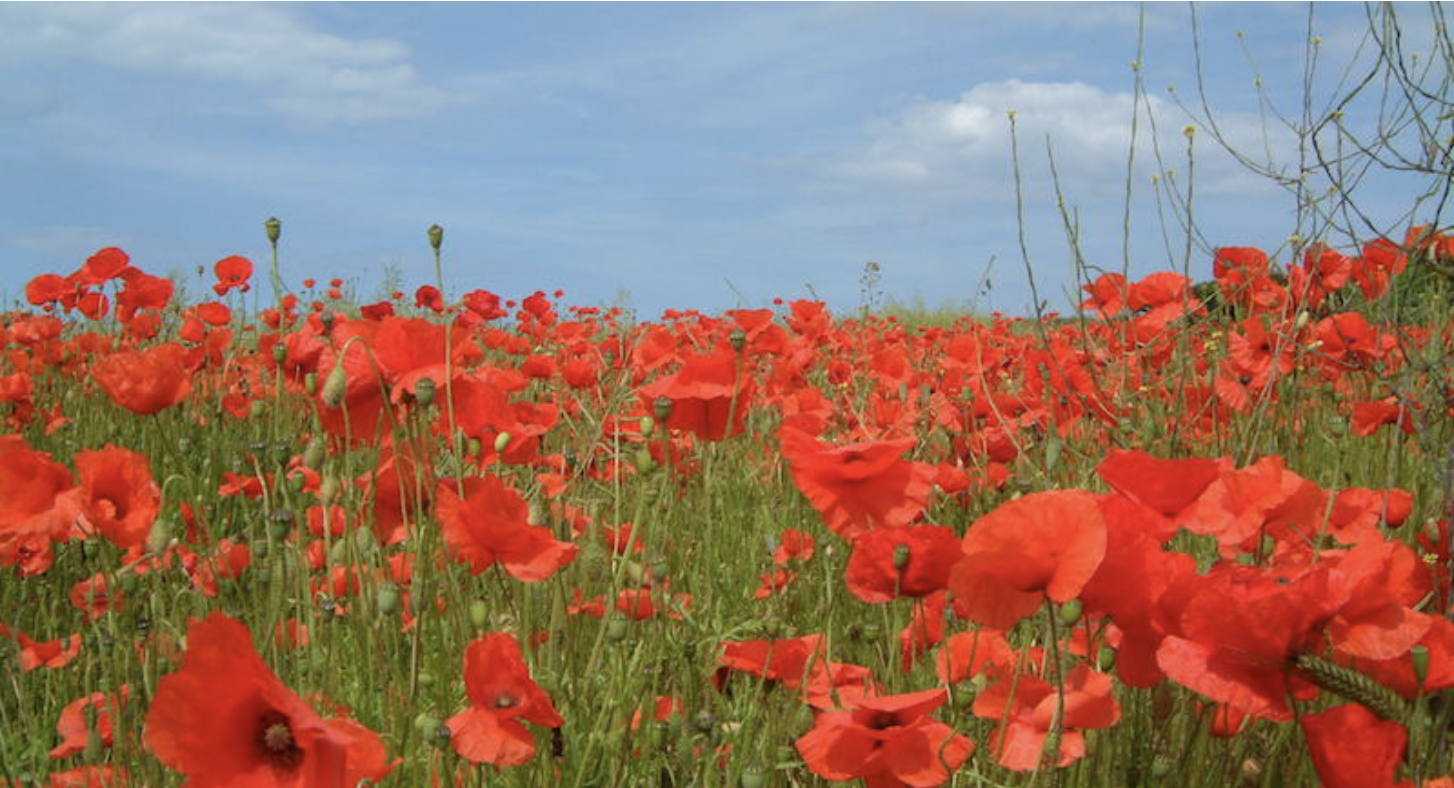8F1 English
Section outline
-
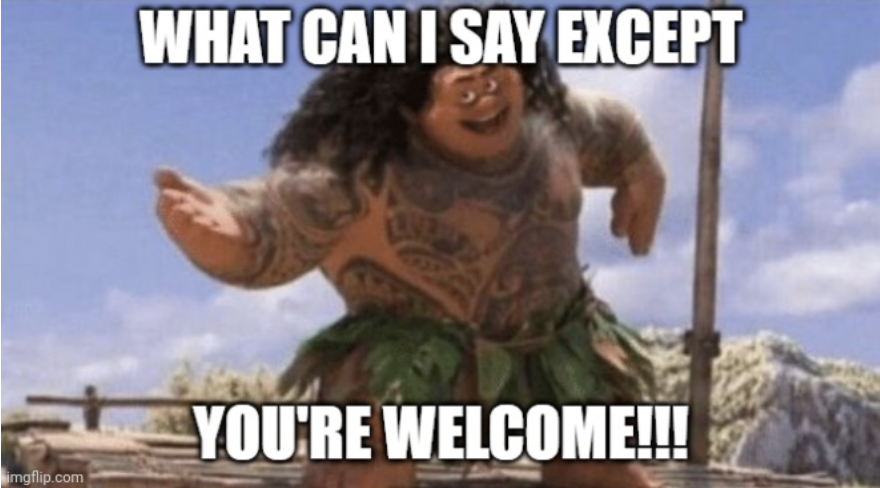
Whāia te iti kahurangi ki te tūohu koe me he maunga teitei
Seek the treasure you value most dearly: if you bow your head, let it be to a lofty mountain
Kia ora, and welcome to your English course page for 2023. My name is Miss Wright and I will be your English teacher this year. This page is where you will be able to find all the necessary information you will require for your English course. All tasks and assessments will be placed here as well as additional lesson notes and resources. Please make it a habit to check this page at the start of each week, this will ensure that you are aware of any expectations we may have of you at that time.
Enjoy this year and if there are any queries do come and see me or feel free to email me - swright@mhjc.school.nz
Success Criteria:
We are EXPLORING the structure of formal and friendly letters
We are EXPLORING elements of static image and how these send messages to the viewer
Activities:
- Join GoogleClassrooom
- MHOL
- Letters - Why write?
- Library Thursday S.3
Further Learning:
Read a book
-

Ahakoa he iti he pounamu
Although it is small it is a treasure
Kia ora. Welcome back to week three. We have loved having you back at school (Valentines day reference), Hopefully you have got back into the routines and are starting to get to grips with your new timetable. Last week, we started looking at letter writing. Letters are written for a specific audience and purpose. We are going to be exploring the structure of letters and beginning to write letters ourselves.
Success Criteria:
- Locate elements of formal and friendly letters (layout, address, salutation. Body, closing)
*** As Cyclone Gabrielle impacts on Auckland we have moved to on-line learning. We are fortunate that we were able to use our library time last week, so I would like you to spend some time reading the novels you issued. We have looked at the structure of a letter - the notes we made on the board (and copied into our books) were added to last weeks course page. This week we were going to start brainstorming, drafting, publishing and sending letters. The weather has not stopped us doing this, with a few adjustments. Rather than being assigned a recipient, I would like you to choose a classmate to write to. Either email them for their address, or use the schools address i.e.:
In your letter, tell your classmate what you have done to prepare for the cyclone, how you are feeling about it, and then you can choose the topic/idea for your 3rd body paragraph. *****Sheryl Wright
Mission Heights Junior College
103 Jeffs Road
FlatBush
Auckland 2019
Activities:
- Annotate letters (groups)
- Select a purpose and audience (lucky dip)
- Draft a letter for this purpose and audience
Further Learning:
Read a book
- Locate elements of formal and friendly letters (layout, address, salutation. Body, closing)
-

He maonga āwhā
Calm after the storm
Kia ora. I am so excited - we get to have a Monday and Tuesday on site! It's incredible to think that it is week four and this will be the first Monday we meet. Have you been seeing some of the images of Cyclone Gabrielle's devastation around the North Island? For some of these communities this is another in a long line of natural disasters. Tairawhiti was impacted by Cyclone Bola in February 1988, The Hawkes Bay region endured a major Earthquake in 1931 which led to the rebuild of Napier in an Art Deco style. In Auckland, the west coast, especially our beautiful black sand beaches of Piha and Muriwai have been seriously affected. It seems incredible that so many significant events have happened over the past 3 years! There are many books written about some of these events - I am sure the Cyclone Gabrielle events will also form part of our literary landscape before too much longer - perhaps you will be one of the authors recounting these tumultuous times! This week you are off to Goat Island. What will the effect on our marine environment be? We will not be going to the library this week as you are all off snorkling.
Success Criteria:
- Match elements of formal and friendly letters (layout, address, salutation. Body, closing)
- Use some of these letter writing elements in my own work
Activities:
- Complete letter, create envelope and stamp and post
- Elements of Static Image
Further Learning:
Read your library book/complete lettersEXPLORE / TŪHURA learning intentions:
- We are EXPLORING the structure of formal and friendly letters
- We are EXPLORING elements of static image and how these send messages to the viewer
-

Iti rearea, teitei kahikatea ka taea
Although the bellbird is small, it can fly to the top of the mighty kahikatea
Kia ora. How lucky you all were to have a break in the weather to visit Goat Island. I hope you all had a great experience, even if it was a little rough and the visibility is not the best. Getting into the outdoors in Aotearoa usually involves water, whether is be the ocean, lakes, rivers or rain. Being a New Zealander means knowing how to keep yourself safe around water. This week, we are going to look at infographics that talk about water safety, and explore the techniques used to conver messages through static images. Later in the week we will also look at writing a formal letter (so far, we have focussed on friendlt letters). What are some of the reasons you can think of for someone to write a formal letter?
Success Criteria:
- I can apply visual language techniques when discussing an image
- I can illustrate examples for the techniques
- I can rewrite a formal letter as a friendly letter and vice/versa
Activities:
- Introduction to visual language techniques (static image) Slides on Google Classroom
- Review Formal letter structure
Further Learning:
Read a book - return your book to the library if you have finished reading it (we have library again in week six)FOCUS / ARONGA learning intentions:
- We are FOCUSING on structuring a formal letter for a specific purpose and audience
- We are FOCUSING on being able to create a static image using a range of techniques to deliver a powerful message
-

Me mahi tahi tātou mō te oranga o te katoa
We should work together for the wellbeing of everyone
Kia ora. It's Autumn and we are halfway through Term One. It seems strange to be here already after our unusual start to the year, but you are all doing really well and are to be congratulated on how you have started your academic year. This week, we are going to start working on your first Year 8 Assessment Task. The task will be due in Week Eight and you will have an opportunity to work on it in class. We will also continue our exploration of static images - being able to convery complex ideas through symbol, colour, text and composition is a powerful literacy strategy that can support your written work. It is also library week, please remember to bring your book to school on Thursday so we can return and issue.
Success Criteria:
- I have created the static image and can explain the choices I have made
- I have drafted, written, proofread and published my letter
Activities:
- Introduce Assessment Task One
- Review Surf Lifesaving NZ Report and Infographics
- Brainstorm and research selected element of water safety
- Draft letter
- Library
Notes:

Further Learning:
Read your book, organise your workload for your Assessment task.PLAN & DO / WHAKAMAHI learning intentions:
- We are PLANNING our static image and letter to an authority regarding water safety
-

Ehara taku toa i te toa takitahi, engari kē he toa takitini
My success should not be bestowed onto me alone, it was not individual success but the success of a collective
Kia ora. By now you should have read through your assessment task and instructions and have a good idea of the topic you will research and share through your letter to the editor. Use the dot/jot technique we looked at in class last week to support you when you are gathering your information and statistics. You should aim to have your research completed and your letter drafted by the end of this week so that you can spend your time proofreading, editing and publishing next week. Your assessment is due on Thursday of Week 8. I will give you time this week and next week to work on your task, but you may also have to use some at home time to complete your work. This is especially true on Thursday this week when school is closed due to teacher strike action. Miss Yacos (from America!) will be joining us for the rest of the term. I know you are all going to show the MHJC way and be AMAZING!
Success Criteria:
- I have drafted, written, proofread and published my letter
Activities:
- Identify topic for research
- Research topic and make good, accurate notes
- Draft letter
- Proofread and Edit
Further Learning:
Read a book, work on Assessment Task OnePLAN & DO / WHAKAMAHI learning intentions:
- We are PLANNING our static image and letter to an authority regarding water safety
-

Mahia i runga i te rangimārie me te ngākau māhaki
With a peaceful mind and respectful heart, we will always get the best results
Kia ora. Well done on bike safety last week. It was great to see you all out in the fresh air and learning how to be safe on the road. Ka pai! Hopefully, this week will have fewer interruptions to our classroom program as you work to complete and submit your first assessment task. I have opened submissions from Wednesday, though your task is not due until Thursday. We have library sessions on Thursday, you will have an opportunity to upload your assesssment task during this time. You will be uploading your letter (make sure you have typed it up on a document). Hopefully you will have remembered to check the marking rubric and taken the time to proofread and edit carefully.
Success Criteria:
- I have drafted, written, proofread and published my letter
Activities:
- Complete research and draft letter
- Proofread and edit
- Publish letter
- Upload Assessment task
Further Learning:
Assessment task, read a book, remember library books for return on ThursdayPLAN & DO / WHAKAMAHI learning intentions:
- We are PLANNING our static image and letter to an authority regarding water safety
-
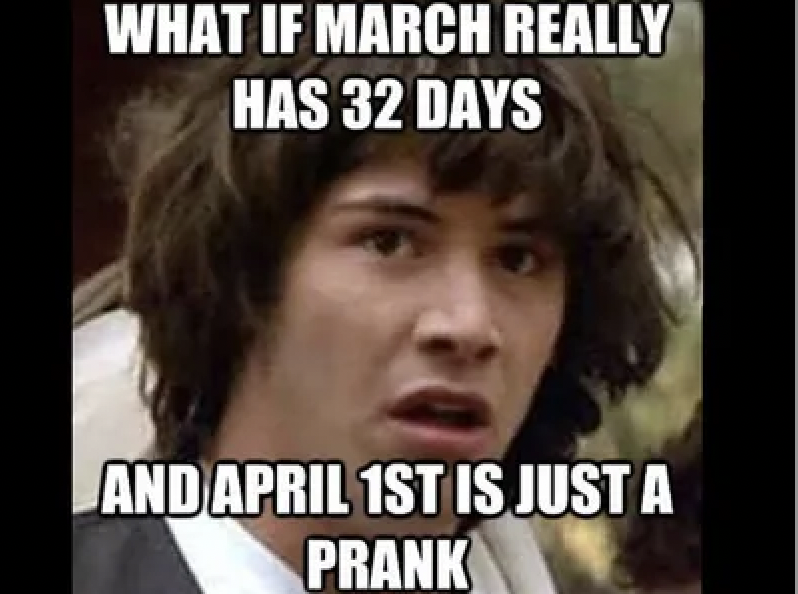
Tā te tamariki tāna mahi wāwāhi tahā
It is the job of the children to smash the calabash
Kia ora. Well done on submitting your first Year 8 Assessment Task. You must be feeling very proud of yourselves. Ka Pai! I will be working through marking them all over the next week or so. Please don't ask when you will be getting your grades back, I need to mark everyones, and do some moderation with other teachers before I can publish them. I want to make sure you are given the grades your work deserves! This week, we are going to reflect on the learning we have done so far this term. Miss Bryce is also going to take the opportunity to take some lessons. Remember, she is used to teaching students in an American High School, so this is your opportunity to show her how amazing ākonga in Aotearoa are! (And remember to watch out for April Fool's Day on Saturday!)
Success Criteria:
- I can explain why people write letters and how the purpose and audience is an essential part of planning letter writing
Activities:
- Reflection Task
- Miss Bryce's activities
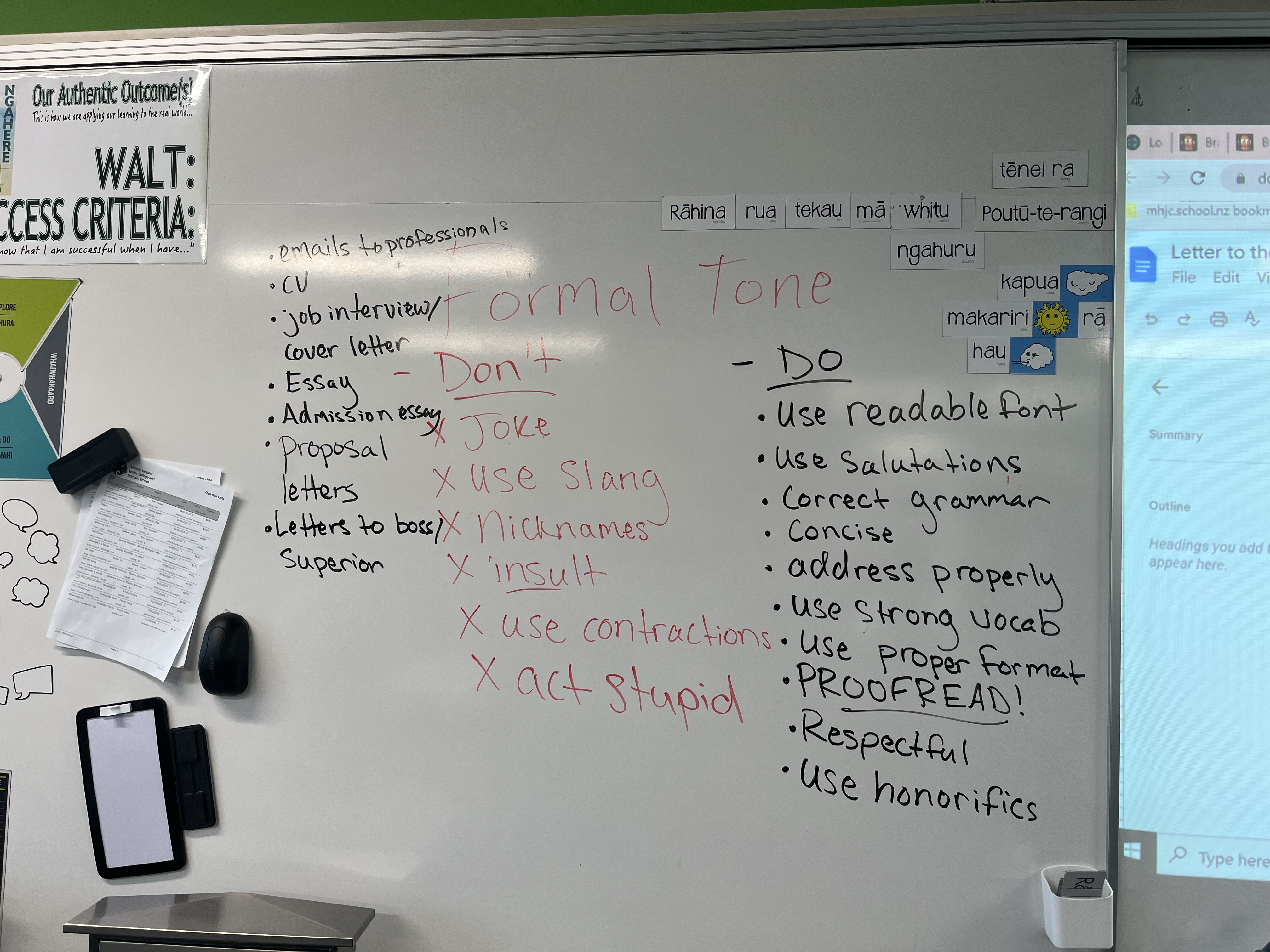
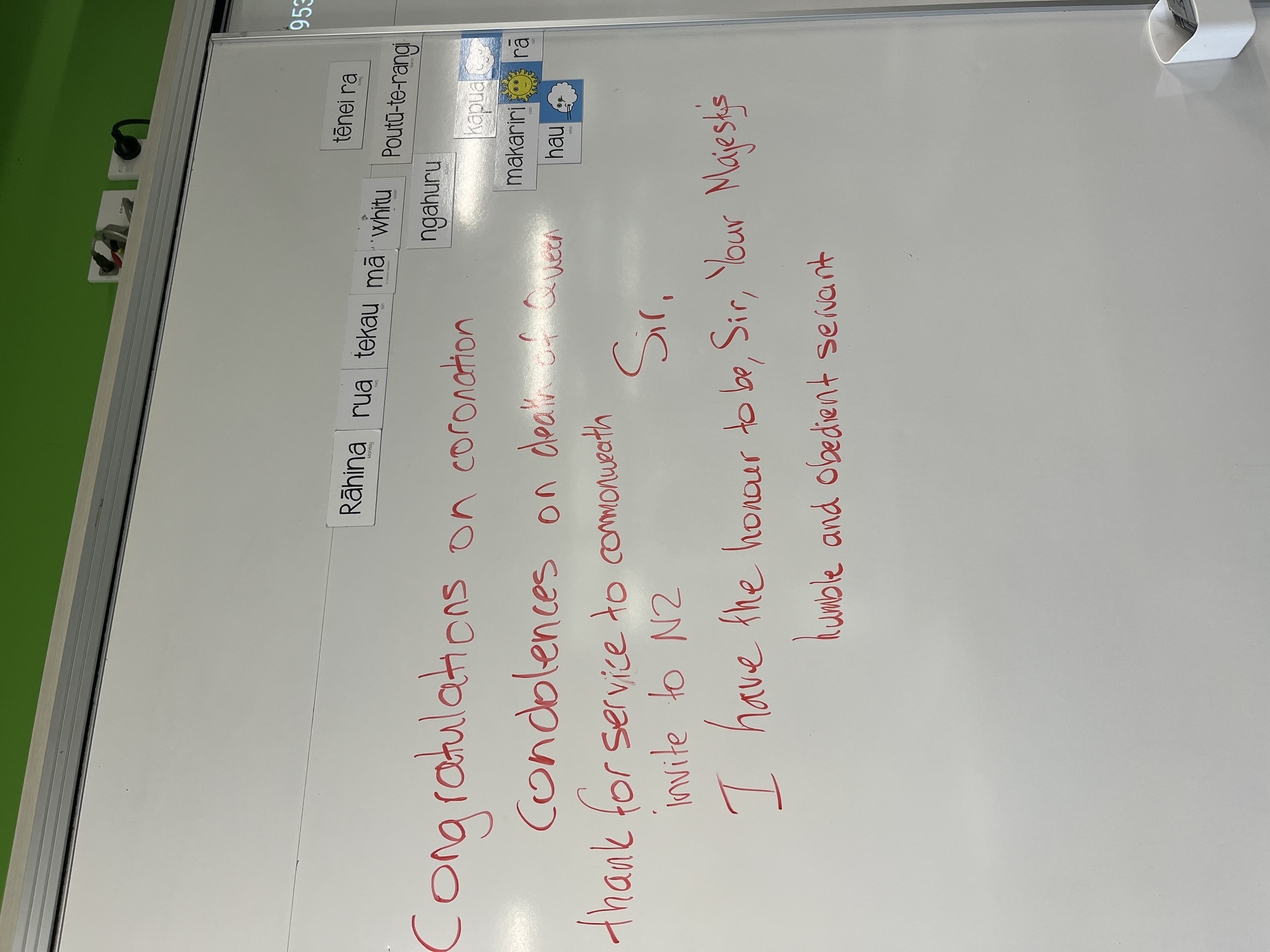
Further Learning:
Read a bookREFLECT / WHAIWHAKAARO learning intentions:
- We are REFLECTING on visual language techniques and how these can impact on an audience
- We are REFLECTING on how letter writing can make connections
-
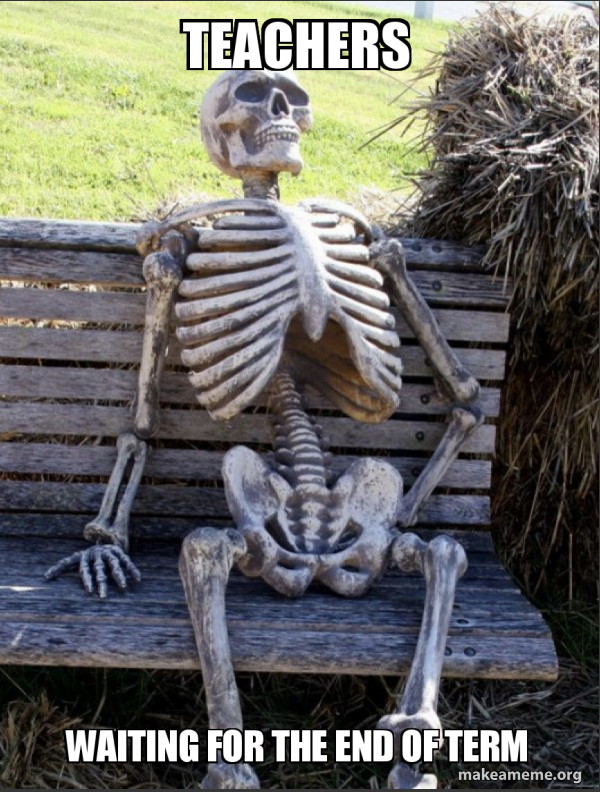
Ka pū te ruha, ka hao te rangatahi
As a old net withers another is remade
Kia ora. Welcome to the last week of term. We have a very busy week. The celebration assembly is on Tuesday, there will be a whanau assembly later in the week, you have letters to the King to complete, publish and envelope ready for me to send AND it is Miss Bryce's last week. Phew - are you exhausted yet. Oh - it's also a short week, so we have all this to do in only three and a half days.
Success Criteria:
- We are REFLECTING on how letter writing can make connections
Activities:
- Poetry Activity (Miss Bryce)
- Complete and publish letters
Further Learning:
Read a book, return library booksREFLECT / WHAIWHAKAARO learning intentions:
- We are REFLECTING on visual language techniques and how these can impact on an audience
- We are REFLECTING on how letter writing can make connections
-
EXPLORE / TŪHURA learning intentions:
- We are EXPLORING how to express our point of view and perspectives through an oral presentation so that we can speak up on an issue that concerns me
- We are EXPLORING by recognising that we all have differing opinions on issues and their impact
- We are EXPLORING by investigating a topic of interest
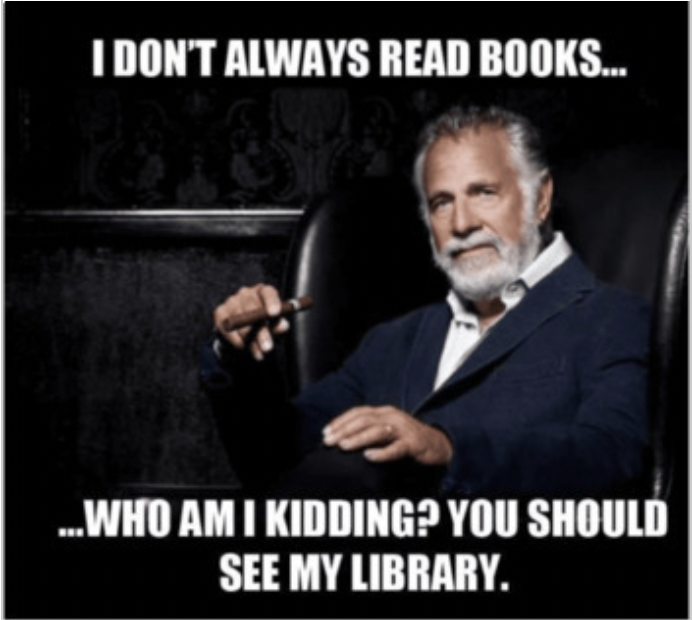
Ko te manu e kai ana i te miro
'the forest belongs to the bird who feasts on the miro berry, the world belongs to the bird who feasts on education'
Kia ora, welcome back. What a wonderfully long break we have had. I think we are so fortunate that the weather has been more settled than our last break. I hope you all took the opportunity to rest and relax after a very busy Term One. This term, we are going to focus on unpacking the anatomy of a story/novel. The context this term is survival/challenge, and one of the things we will be looking at is conflict and challenge in stories. We will also be looking at the themes around survival and challenge that feature so majorly in most young adult fiction. Please remember to return any overdue library books so that we are able to issue novels from the library on Week Three (I know, it's a long time between library visits, but I am happy to return books for you, and you can also visit the library yourself during lunchtime).
Success Criteria:
- I can list elements in an extended text
- I can retell the main points of the extended text
- I can identify the main characters in the extended text
- I can define key words about the structure of extended texts
Activities:
- Brain dump - elements of a story/novel (padlet)
- Shared reading
- Story map (google classroom)
Further Learning:
Read a book!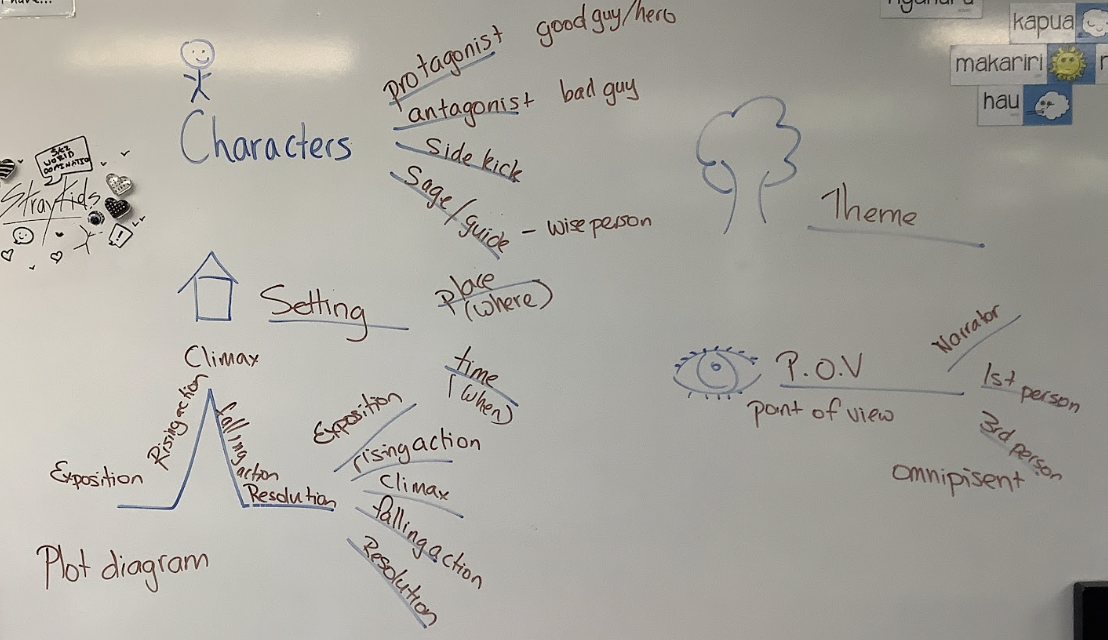

EXPLORE / TŪHURA learning intentions:
- We are FOCUSING on identifying elements of structure used in a novel
- We are FOCUSING on being able to make connections between the text and our personal experiences and feelings
-
EXPLORE / TŪHURA learning intentions:
- We are EXPLORING how to express our point of view and perspectives through an oral presentation so that we can speak up on an issue that concerns me
- We are EXPLORING by recognising that we all have differing opinions on issues and their impact
- We are EXPLORING by investigating a topic of interest

Kia Kawea tātou e te rēhia.
Let us enjoy the spirit of entertainment.Kia ora. It's Week TWO!!!!! I know, it seems like we have not been at school for that long. This weekend is the King's Coronation. I wonder if our letters have reached Buckingham Palace yet..... I posted them on Saturday (the day after Good Friday) and sent them airmail so they should be there..... I wonder if we will get a response. Remember, you used your personal address in the letter, so any responses will go to your houses. How exciting is it going to be if someone gets a reply!! This week we are going to continue looking at short stories and identifying the elements of an extended text we explored last week. We are going to look at how characters are developed - and the role they play in the text (protagonist, antagonist etc.)
Success Criteria:
- I can list elements in an extended text
- I can retell the main points of the extended text
- I can identify the main characters in the extended text
- I can define key words about the structure of extended texts
Activities:
- Read short story (as a class)
- Character profile - personality and appearance
- Character role with supporting evidence
Further Learning:
Read a book!EXPLORE / TŪHURA learning intentions:
- We are FOCUSING on identifying elements of structure used in a novel
- We are FOCUSING on being able to make connections between the text and our personal experiences and feelings
-

Hurihia to aroaro ki te ra tukuna to atarangi kia taka ki muri i a koe
Turn your face to the sun and the shadows fall behind you
Kia ora. Did you watch the Coronation on Saturday? It has been 70 years since the last one, imagine the research and reading that would have been needed in preparation. I wonder what theme we can create around the Coronation. This week we are going to explre theme through our reading. A theme is more than a single word (or a summary of the story). The theme is the big idea or message the author wants us to gain as a result of reding their writing.
Success Criteria:
- Identify and describe with examples text elements
Activities:
- Discussion of theme - brain storm
- Using a theme tree to identify theme
- Writing about the theme of our reading
Further Learning:
Read a bookEXPLORE / TŪHURA learning intentions:
- We are EXPLORING by identifying and recording elements in our extended text
- We are EXPLORING by skimming and scanning the text to locate and select supporting evidence
-
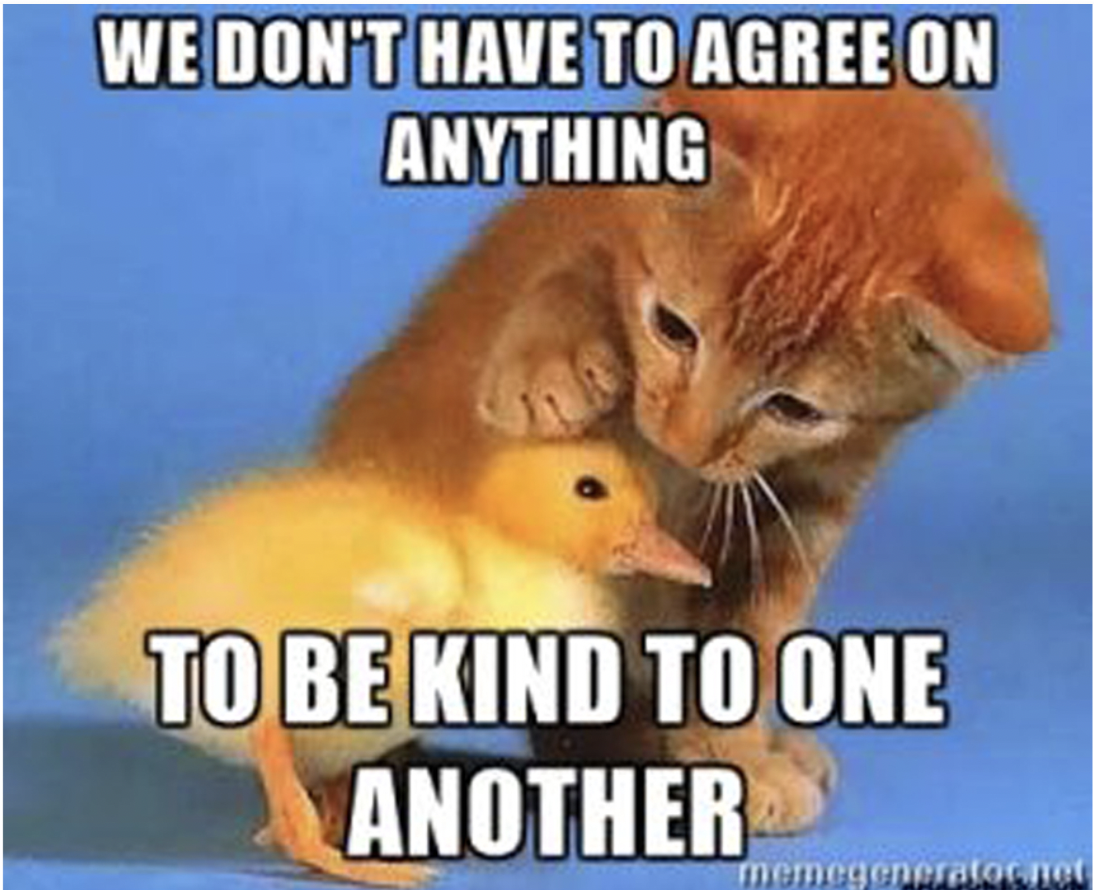
He aroha whakato, he aroha ka puta mai.
If kindness is sown, then kindness is what you shall receive
Kia ora. Welcome to Kindness Week. Kindness lives in what we say and how we act. What can you do this week to make a positive difference to the people and places around you? Maybe you started with Mother's Day on Sunday. How did your celebrate the ones who nurture you? This week, we are going to continue our guided exploration of the elements of a story. So far, we have looked at character, theme and setting- can you guess what will be next?
Success Criteria:
- Identify and describe with examples text elements
Activities:
- Discussion of conflict/summary
- Note making of summary using graphic organiser (somebody wanted but so then)
- Writing own summary of the text
Further Learning:
Read a bookEXPLORE / TŪHURA learning intentions:
- We are EXPLORING by identifying and recording elements in our extended text
- We are EXPLORING by skimming and scanning the text to locate and select supporting evidence
-

Ehara taku toa i te toa takitahi, engari he toa takitini
Success is not the work of an individual, but the work of many
Kia ora, it was great to see so many of you in the PINK last week to support kindness week. Remember, it is not the colour of the cloths you wear that make you an upstander - it is the actions you take to make your environment (people, places, things) better because you're there! This week, we are going to start working in small groups to unpack a short story. We will use the same process we used when looking at "By the River" but this time your group will be working through the tasks without my direct intervention. You will be able to use the graphic organisers and your models from last week and will be able to work at a group to complete the tasks. We have library on Thursday so make sure you know where the books you issued are so that you can return them this week.
Success Criteria:
- Identify and describe with examples text elements
- Summarise using a simple framework (somebody, wanted, but, so, then)
- Express a personal response to a text
Activities:
- Meet as a group and read story
- Complete group activities
- Present to another group
- Personal reflection on groups success and personal effort
Further Learning:
Read a book!FOCUS / ARONGA learning intentions:
- We are FOCUSING on identifying elements of structure used in a novel
- We are FOCUSING on being able to make connections between the text and our personal experiences and feelings
-
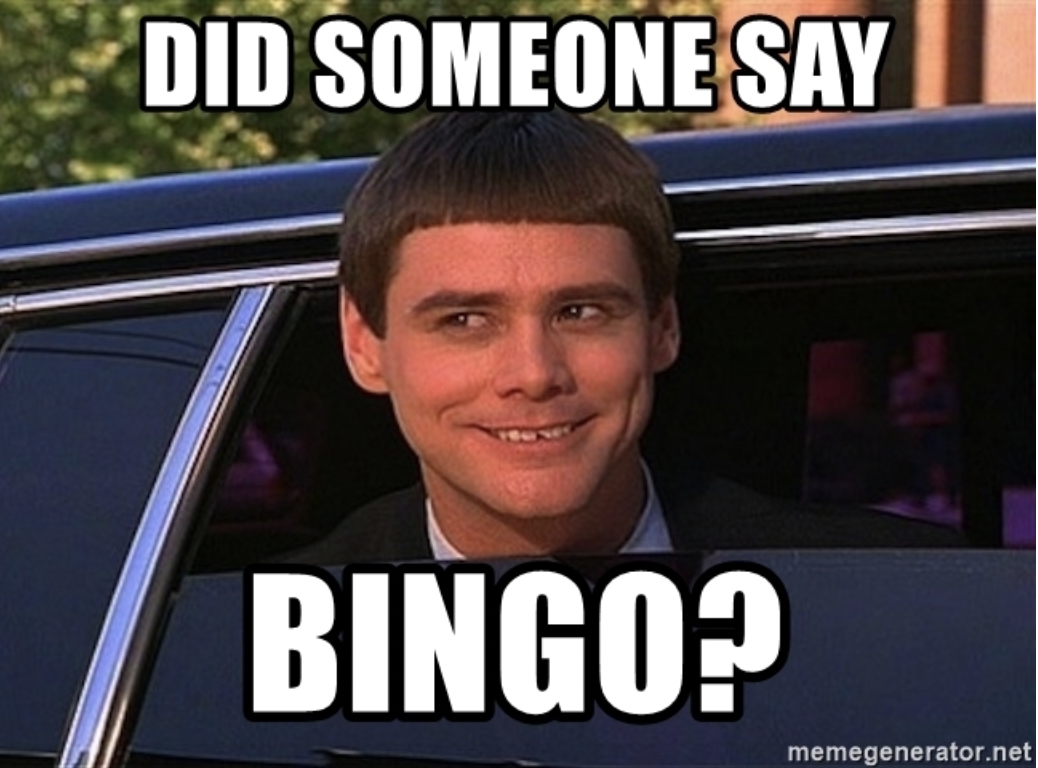
He kai kei aku ringa
There is food at the end of my hands
Said by a person who can use his basic abilities and resources to create success.
Kia ora. Well, that the first half of the term done and dusted..... we are quickly approaching the official start of winter too. This year seems to be flying by with many trips, events, special occasions and wild weather events. i wonder what the remainder of the term will bring. This week (and for the next few weeks) you will be working on your book bingo activities. Please remember, your bingo tasks are a GROUP activity. Please help each other to achieve the high standard I know you are capable of. You should not complete a task in one sesion - if you do, check with a group member and get some feedback on how to take your work up another level. The shared work and graphic organisers we completed for "By the River" are there to support you when you are completing the tasks that have to do with the structure of short text.
Success Criteria:
- Identify and describe with examples text elements
- Summarise using a simple framework (somebody, wanted, but, so, then)
- Express a personal response to a text
Activities:
- Group Bingo Activities
Further Learning:
Read a bookFOCUS / ARONGA learning intentions:
- We are FOCUSING on identifying elements of structure used in a novel
- We are FOCUSING on being able to make connections between the text and our personal experiences and feelings
-
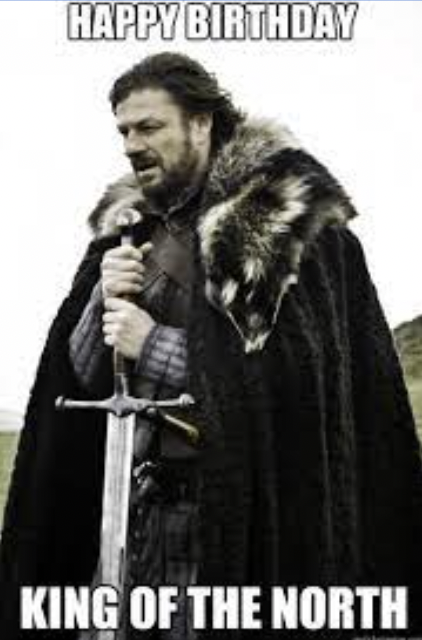
Ehara taku toa i te toa takitahi, engari he toa takitini
Success is not the work of an individual, but the work of many
Kia ora. I hope you all enjoyed celebrating the King's Birthday - I am sure we will get used to the change of name before too long! It is an interesting week - we have Tuesday, Wednesday and Friday on site. We are also starting the asTTle testing so your sessions may also be impacted by this. You have two more weeks to complete your reading/book bingos. Please show the depth of thinking I know you are capable of producing.
Success Criteria:
- Identify and describe with examples text elements
- Summarise using a simple framework (somebody, wanted, but, so, then)
- Express a personal response to a text
Activities:
- Group bingo activities
Further Learning:
Read a bookPLAN & DO / WHAKAMAHI learning intentions:
- We are PLANNING our response to extended text by using our notes to demonstrate our understanding of the elements of an extended text.
- We are applying our personal response to the elements to justify our decisions/opinions.
-
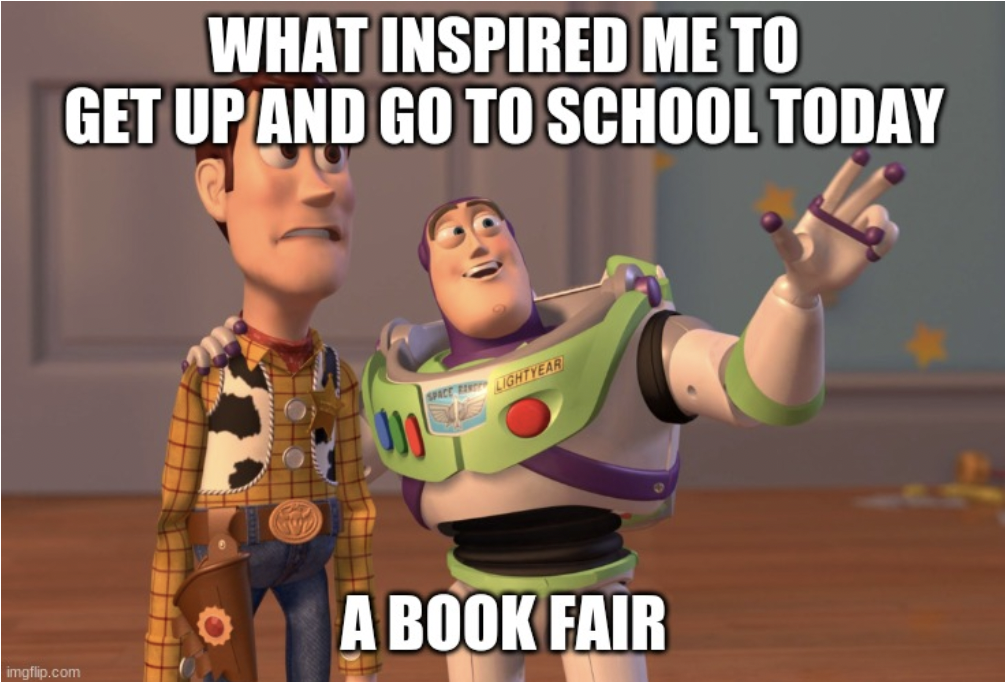
Nāu te rourou, nāku te rourou, ka ora ai te iwi
With your food basket and my food basket the people will thrive
Kia ora. Welcome to week eight. This week there are asTTle tests and it is also time for your group to start pulling together your bingo tasks to develop your book fair presentation. This term our concept has been survivor. How does this link to our book fair? Have you had to work as a team and to your individual strengths? Were you able to work together to support and overcome challenges? Are these the same traits a survivor has to use if they are lucky enough to be a member of a team? By the end of this week you need to have all your bingo tasks completed (to the standard you know I have set for you). You will then have to decide as a group how you are going to share this with your audience (Year 8 & 9 classes and possibly an invite to Year 7 and 10's to visit and view too). I am not sure of the exact timing yet as it will need discussion with other teacher, but I envisage the end of week 9/start of week 10. Focus Friday week 9 seems the easiest time at the moment as you will be in home bases session 3 & 4 so you could set up for presentation in 3 and present in 4. I am sure the teacher looking after you for the rest of the term will let you know.
Success Criteria:
- I have used a SEXY writing framework to structure my writing
- I have included examples and evidence from the text to support my writing
- I have linked elements of the text to my personal response
- I have checked my work carefully for structure and sense
- I have use proofreading skills to improve my work
Activities:
- Complete bingo activities
- Discuss presentation as a group
- develop presentation plan
- Allocate presentation roles
Further Learning:
Read a bookPLAN & DO / WHAKAMAHI learning intentions:
- We are PLANNING our response to extended text by using our notes to demonstrate our understanding of the elements of an extended text.
- We are applying our personal response to the elements to justify our decisions/opinions.
-

Ko te pae tawhiti whāia kia tata, ko te pae tata whakamaua kia tīna
Seek out distant horizons, and cherish those you attain
Kia ora. Thank you do much for your kind words at my farewell on Friday - it is always a challenge to move to a new school - for teachers as well as students. I will carry all that I have learnt over the past 3.5 years with me. I wish you all the very best for the remainder of the year and for your time at MHJC. I look forward to hearing about your successes.
Success Criteria:
- I have used a SEXY writing framework to structure my writing
- I have included examples and evidence from the text to support my writing
- I have linked elements of the text to my personal response
- I have checked my work carefully for structure and sense
- I have use proofreading skills to improve my work
Activities:
- Complete bingo activities
- Prepare for book fair
Further Learning:
Read a book (the image this week is from one of my favourite books - The Hitchhikers Guide to the Galaxy bu Douglas Adams)PLAN & DO / WHAKAMAHI learning intentions:
- We are PLANNING our response to extended text by using our notes to demonstrate our understanding of the elements of an extended text. We are applying our personal response to the elements to justify our decisions/opinions.
-
EXPLORE / TŪHURA learning intentions:
- We are EXPLORING how to express our point of view and perspectives through an oral presentation so that we can speak up on an issue that concerns me
- We are EXPLORING by recognising that we all have differing opinions on issues and their impact
- We are EXPLORING by investigating a topic of interest
Week 1, T3.
Kia ora and welcome to my Term 3 English Class.
My name is Mr. Hishey and I will be your teacher for English for Term 3.
The context for the term is Elections as NZ will be having its elections this year.
So, we will be exploring oral, written and visual language to look within the structure of the English language to make meaning. Then we can use strategies ( the ability to connect between the oral, written and visual) to create meaning to apply in context in a meaningful way.
Explore: LI: Understand the links between oral, written and Visual language feaures.
SC: Connecting: Oral to Listening and speaking, Written to reading and writing, visual to viewing and presenting. Students need to practise making meaning - of ideas students receive, and creating meaning - for themselves and others. As students progress, they will use their skills to engage in tasks and texts that are increasingly challenging.
-
EXPLORE / TŪHURA learning intentions:
- We are EXPLORING how to express our point of view and perspectives through an oral presentation so that we can speak up on an issue that concerns me
- We are EXPLORING by recognising that we all have differing opinions on issues and their impact
- We are EXPLORING by investigating a topic of interest
Success Criteria
Weeks 8-9
I can identify key points I want to develop as part of the speech
I can describe the cause and effect of my topic
I can define the key aspect of my topic
I can recognise others’ points of view and perspectives
I can create a mindmap of the key points and how they are connected
I can compare and contrast the information gathered through the various sources of information
I can explain the key aspects of the research topic
I can classify the ideas so that they are ordered in a logical manner
I can analyse the data to form valid conclusions
Uses logic and argument with confidence to justify and substantiate ideas and opinions
I can interpret the effectiveness of oral language devices so that I can present my ideas in a convincing manner
I can evaluate other speeches for impact
I can make a generalisation about what makes an effective speech
-
EXPLORE / TŪHURA learning intentions:
- We are EXPLORING how to express our point of view and perspectives through an oral presentation so that we can speak up on an issue that concerns me
- We are EXPLORING by recognising that we all have differing opinions on issues and their impact
- We are EXPLORING by investigating a topic of interest
Success Criteria
Weeks 8-9
I can identify key points I want to develop as part of the speech
I can describe the cause and effect of my topic
I can define the key aspect of my topic
I can recognise others’ points of view and perspectives
I can create a mindmap of the key points and how they are connected
I can compare and contrast the information gathered through the various sources of information
I can explain the key aspects of the research topic
I can classify the ideas so that they are ordered in a logical manner
I can analyse the data to form valid conclusions
Uses logic and argument with confidence to justify and substantiate ideas and opinions
I can interpret the effectiveness of oral language devices so that I can present my ideas in a convincing manner
I can evaluate other speeches for impact
I can make a generalisation about what makes an effective speech
-
Term 4 Context: Circus
LI: Show an increasing understanding of how to shape texts for persuasive writing.
Task: Mindmap in your groups. Circus. Discuss ideas to be able to begin writing a persuasive text on an interesting perspective of circus life and do some reseach to enrich your writing.
Why? This is to help you make connections with your writing sample for Week 2.
SC:
- constructs texts that show an awareness of purpose and audience through deliberate choice of content, language, and text form
- conveys and sustains personal voice
- achieves some coherence and wholeness when constructing texts
- organises and sequences ideas and information for a particular purpose or effect
- uses a variety of sentence structures, beginnings, and lengths for effect.
- grammar, spelling and paragraph

